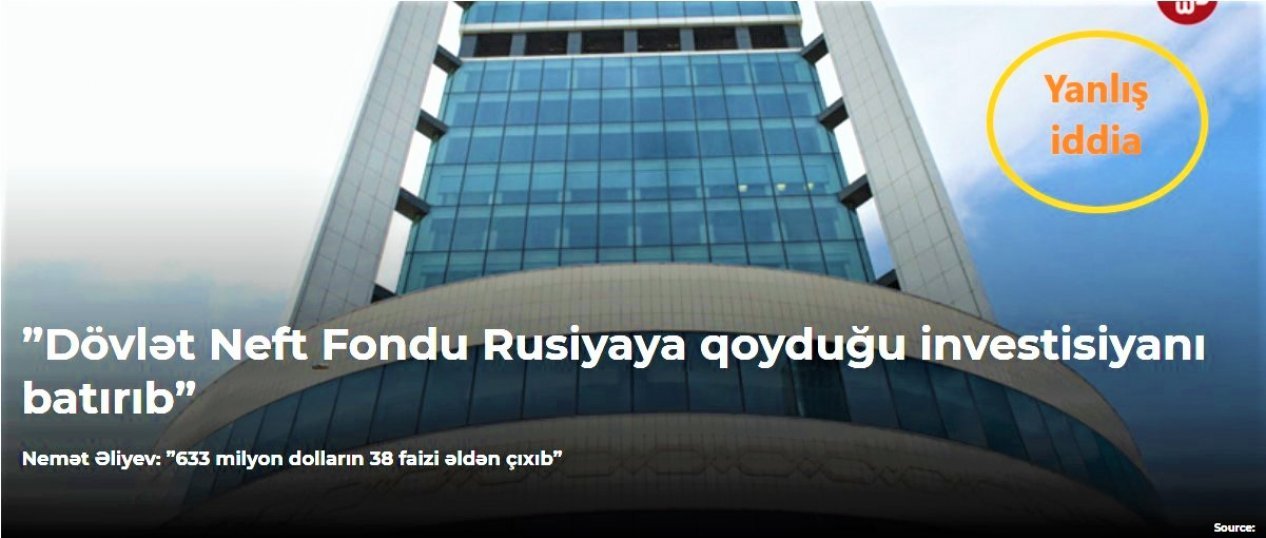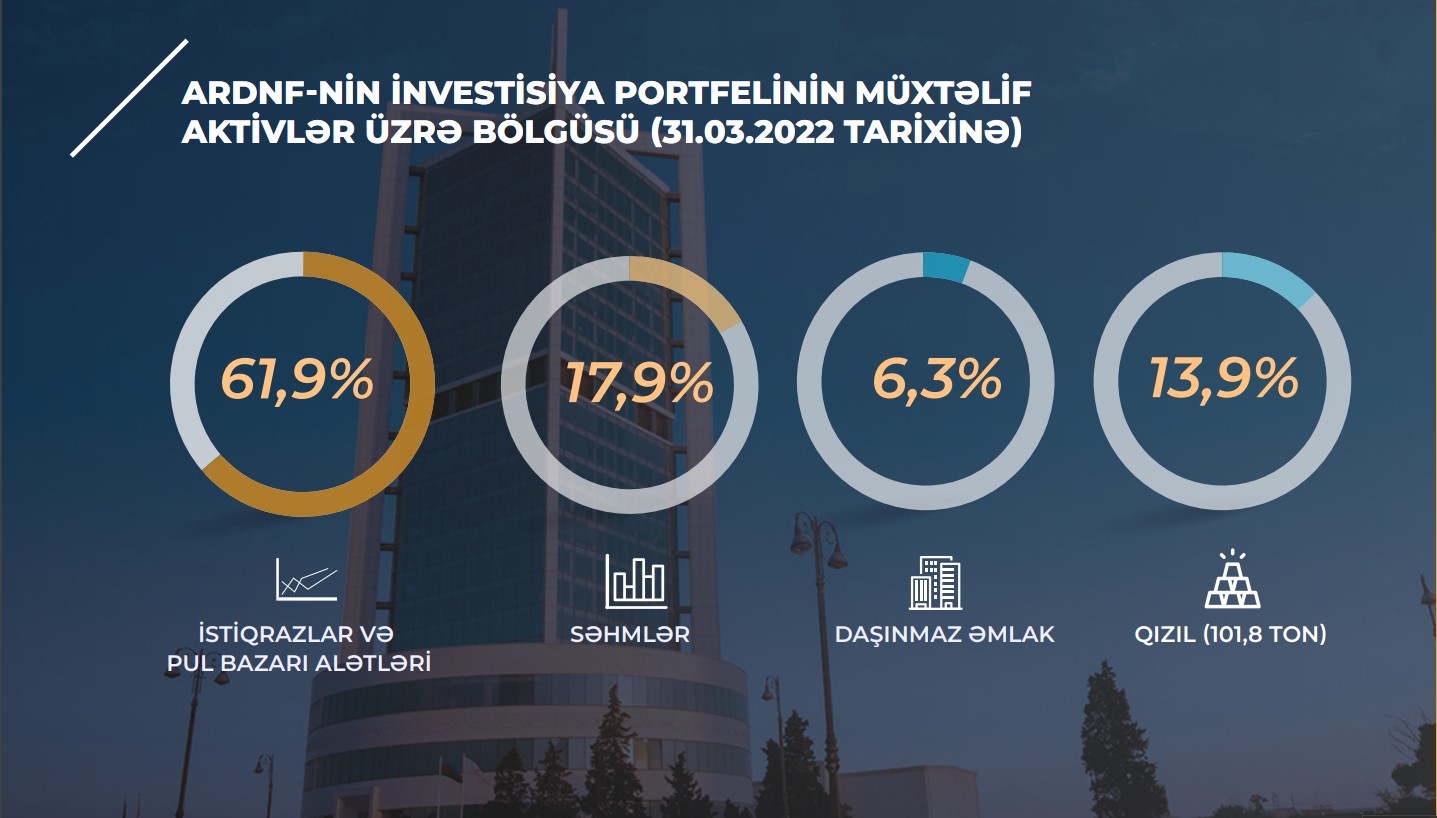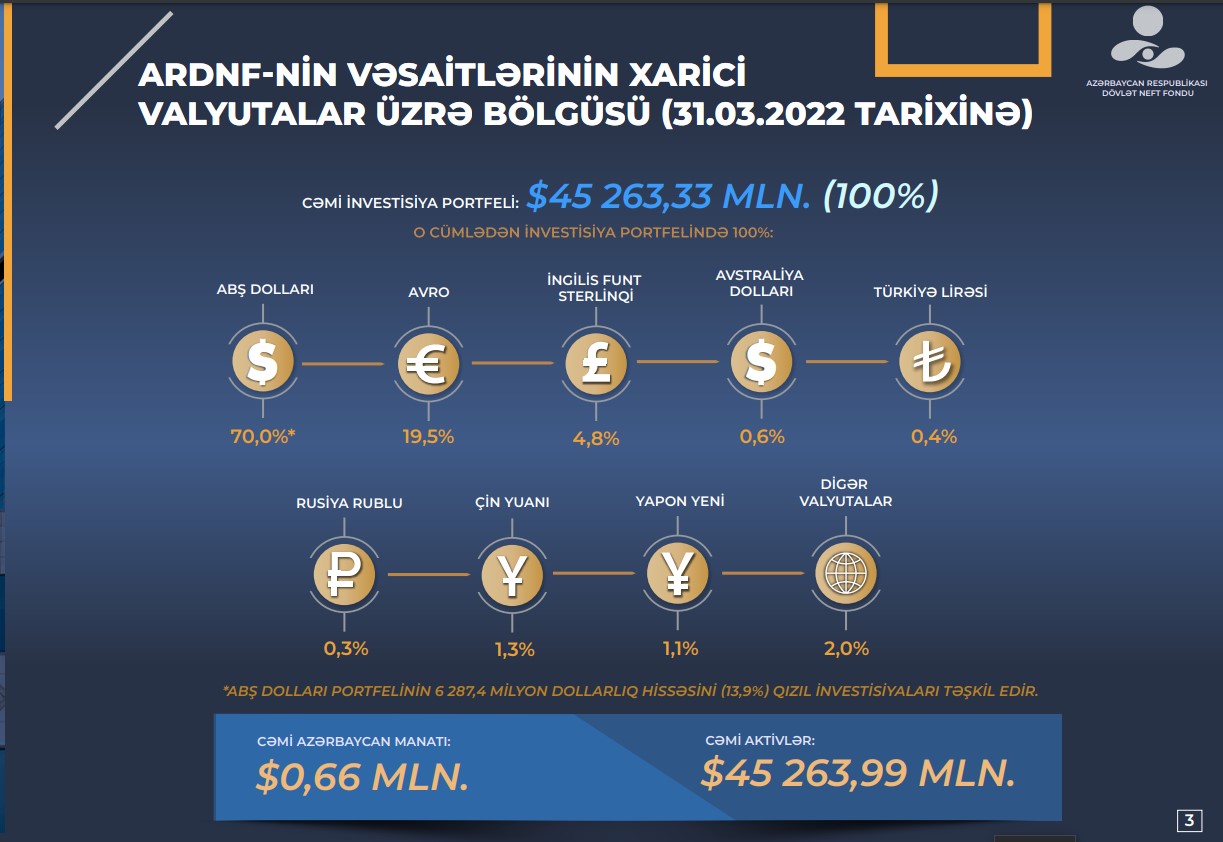
Nemat Aliyev, a member of the Presidium of the opposition Azerbaijani Popular Front Party, claimed that the investments of the State Oil Fund of Azerbaijan (SOFAZ) in the banking and real estate markets of the Russian Federation have failed, and therefore the Fund’s assets have decreased. He claims that the State Oil Fund has lost $497 million in Russian markets and 79 percent of its capital. The fund's Russian policy has completely failed.
Faktyoxla Lab. has investigated whether the statements of Nemat Aliyev were true. Has the State Oil Fund lost and bankrupted the assets it manages in Russia's financial and real estate sectors?
The first source we will pay attention to is the information released by the State Oil Fund on the results of the first quarter of 2022. It is interesting that Nemat Aliyev also made a judgment referring to the report of the Oil Fund on the results of investment activities for the first quarter of 2022, but drew different conclusions.
Nemat Aliyev claims that the State Oil Fund spent a total of $633 million on real estate in the Russian market and a 3% stake in Bank VTB 8-9 years ago, losing $497 million of that investment. Let's clarify the idea.
First, SOFAZ has not lost any real estate investments in Russia. The share of real estate investments in the structure of the fund's investment portfolio is 6.3%, which in monetary terms means $284 million. (Source)

The Fund has been buying real estate since 2012 and has acquired offices and shopping malls in a number of major cities such as London, Moscow, Paris, Milan, as well as in Seoul and Tokyo in Asia.
Russia's active investment in the real estate market is about $130-135 million in value, which in 2012 included Moscow’s retail and office center “Gallery Actor” (purchased for $133 million) at Tverskaya Street 16. (Source)
The annual rent for the property is $9.6 million, and SOFAZ has received an annual dividend since 2012 by leasing the building to various financial, insurance and consulting services, as well as various luxury and mid-sized commercial companies. It earned at least $96 million a year and spent almost 80 percent of $133 million it once spent. Even if the fund sells the property today for $133 million, it will still be profitable.
The value of the Oil Fund's assets in Russia alone is almost 50 percent, or half, of the value of the joint property in five countries ($284-133 = $151 million). So how can SOFAZ's assets in Moscow be considered worthless? Even if the Fund had to sell the office building in Russia for $136 million, Azerbaijan would still not have suffered losses.
Nemat Aliyev's opinion that the State Oil Fund spent $500 million on shares in Bank VTB. The economist claims that SOFAZ spent a total of $633 million 8-9 years ago on real estate and a 3% stake in Bank VTB. When looking at real estate investment worth $133 million in Moscow, it means that $500 million should be spent on Bank VTB.
Has the Fund invested so much in Bank VTB? The shares in the total assets of the State Oil Fund is 17.9%. The Fund's shares in Bank VTB are equal to 3% of the total shares. This is equivalent to $243 million in monetary terms. The Oil Fund has made significant profits each year from its investments in the Bank of Russia (it has been an investor since 2013). Annual earnings have fluctuated over the years, with a total dividend of $25 million in 2013-2016 ($6.2 million per year) and $7 million in subsequent years. Thus, the volume of assets is 20 trillion rubles. Bank VTB, which has more than 80,000 employees and is one of the most important systemically important banks in the Russian Federation, has paid large profits to all its shareholders by March 2022. This is because the bank's shares have gained more value in the Russian stock market than other financial institutions. (Source)
Thus, the total amount of dividends earned by SOFAZ from Bank VTB over the past 9 years has exceeded $50 million.
The sharp decline in Russia's foreign exchange markets was mainly recorded in March-April, and the average market price index per share of Bank VTB fell from 0.025 percentage points to 0.018 percentage points. It fell by about 10.4 percent.
The loss of SOFAZ's shares in the bank from interest rate fluctuations in 3 months amounted to $23-24 million (243 million * 10.4%). However, after May, the prices of both the ruble and stock indexes in the securities market regained their previous market value. This means that the return on SOFAZ bank investments, which depreciated in the previous two months, has been restored. In other words, SOFAZ's shares in Bank VTB are currently compensating for value losses. (Source)

Finally, let's look at the share of the Russian ruble in the SOFAZ's portfolio. The main share of the Fund's foreign currency distribution is in US dollars (70%). Some 19.5% of the currency share belongs to the euro. After deducting the British pound (4.8%), the Russian ruble accounts for only 0.3 percent of the Oil Fund's remaining 5 percent currency basket. This means that only 0.3% of the Fund's $45.2 billion assets, or $135 million, are rubles. The ruble depreciated by only 20 percent in March. Some 20 percent of 135 million is $25-26 million. This also means that the depreciation of the ruble will affect only 0.2 percent of SOFAZ's foreign exchange reserves. However, a 1 percent increase in the base currency of the State Oil Fund's portfolio, the US dollar, a currency worth $32 billion, brings a dividend of $320 million.
Against the background of complex global market changes, stocks, property, bonds, etc. are expected to fall in price, and no investor is insured against this. It is normal for investors all over the world to lose from the fall in prices, just as they have consistently gained from the rise in stock prices. This is a global economic pattern. For example, in the first quarter of 2022, the leading stock indexes - the European Aviation Index, Euro Stoxx, FTSE 100, DAX, Nasdaq, Nikkei, Hang Seng - fell sharply. The conflict between Ukraine and Russia has accelerated this process. As a result, large companies and shareholders in most countries have lost their investments. (Source)
The net loss of the Norwegian Petroleum Fund, the world's largest fund, due to fluctuations in shares and other financial instruments in international markets in the first quarter of 2022 amounted to $74 billion.
Result:
- It is illogical and unreasonable for Nemat Aliyev to directly link the fact that the assets of the State Oil Fund face negative trends caused by short-term market value fluctuations directly with the Russian markets.
- All indicators of the investment report of the State Oil Fund for the first quarter of 2022 confirm that the Fund did not suffer a loss of $497 million in the Russian real estate market, as well as losses in the form of shares and real estate assets.




















